November 22, 2025 | 01:59 GMT +7
November 22, 2025 | 01:59 GMT +7
Hotline: 0913.378.918
November 22, 2025 | 01:59 GMT +7
Hotline: 0913.378.918
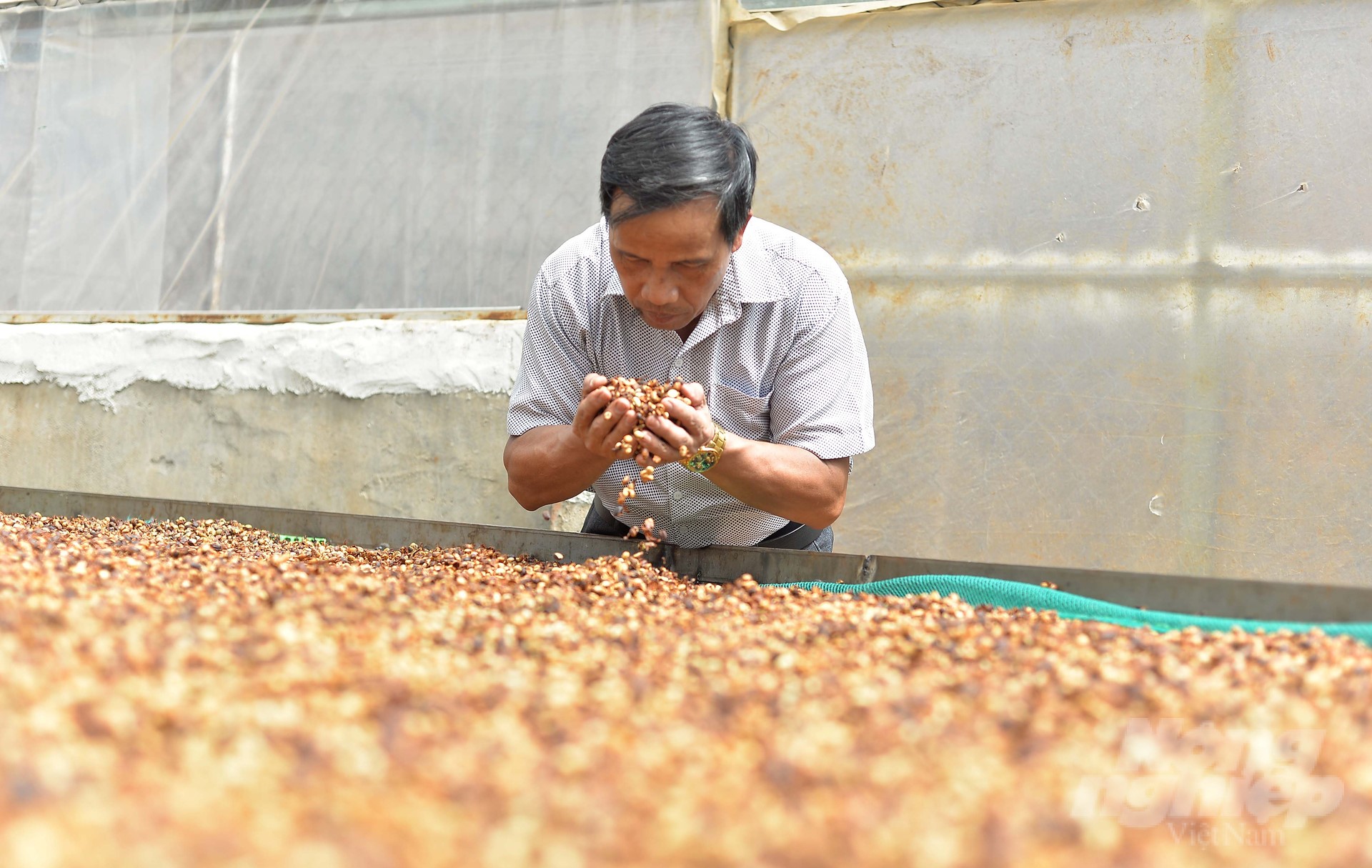
According to forecasts, Robusta coffee will gradually replace Arabica coffee in the market. Photo: Minh Hau.
Mr. Trinh Duc Minh, Chairman of the Buon Ma Thuot Coffee Association (Dak Lak), said that the signal of Robusta replacing Arabica appeared 10 years ago when climate change began to emerge. Experts predict that in the future, the area of Arabica coffee will decrease. Meanwhile, Robusta coffee prefers a hotter climate, so it will gradually replace Arabica coffee and dominate the market.
According to Mr. Minh, the output of Robusta in recent years has been in short supply, and due to the global economic downturn, consumers have gradually replaced expensive coffees with cheaper ones. According to the data that has just been announced by the authorities, the output of Robusta so far accounts for 41% and Arabica for 59%, while many years ago, Robusta always accounted for less than 40% of the world's coffee output.
"Long-term climate change and an increase in consumers’ use of Robusta will gradually shift the taste of consumers in the world from using Arabica to using Robusta. This shift is considered an opportunity for the Robusta coffee industry," said Mr. Minh.
According to the Chairman of the Buon Ma Thuot Coffee Association, for a long time, Robusta coffee has not been recognized, partly due to improper handling, and dissemination has not been paid attention to.
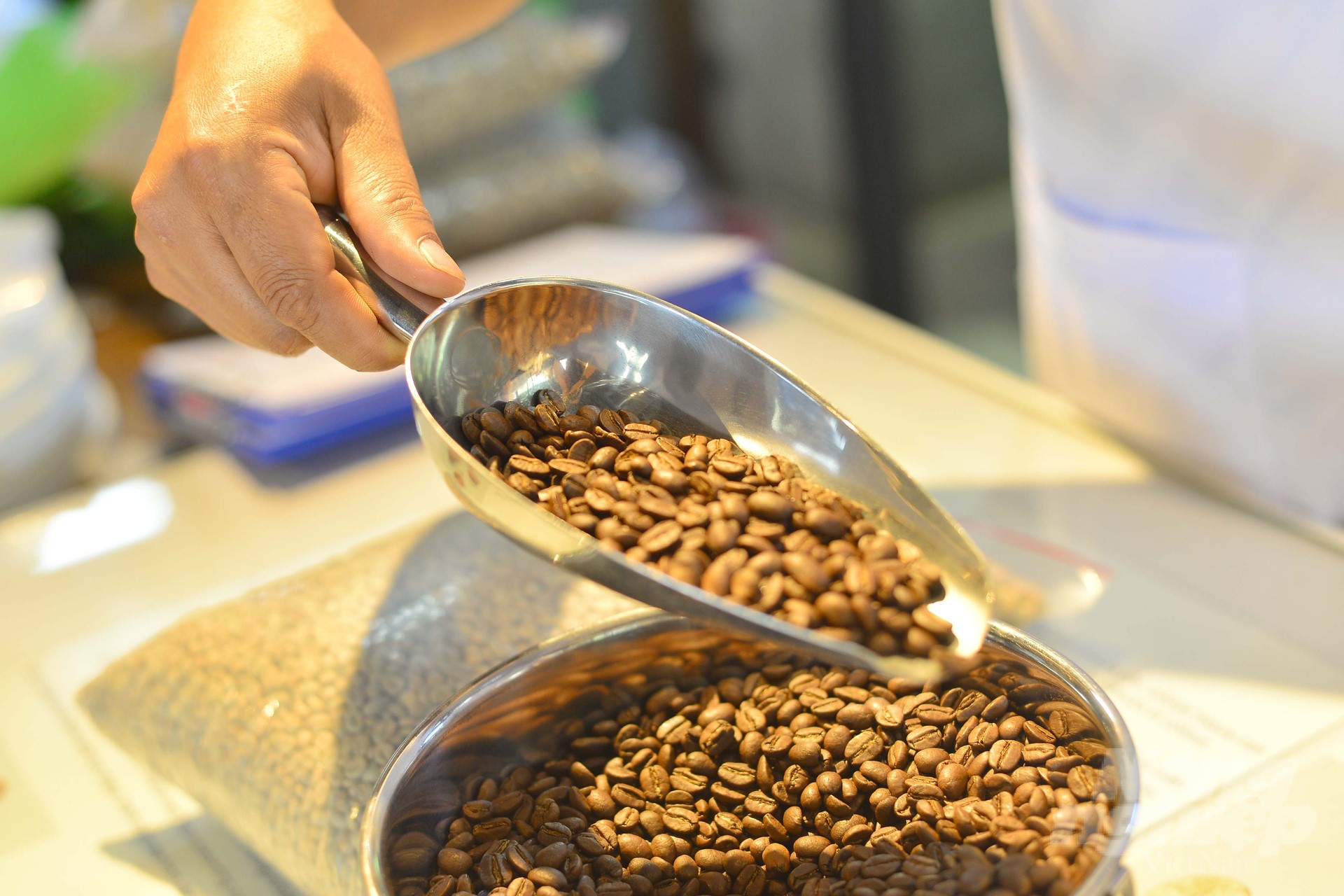
Currently, people and enterprises producing coffee are gradually focusing on improving quality to meet market demand. Photo: Minh Hau.
"Currently, we are standing in front of an opportunity to take Robusta to a new level. Therefore, we must seize this opportunity to improve the quality. In order to do this, it is necessary to strengthen deep processing and improve the quality of raw coffee," said Mr. Minh.
Currently, the Association is improving the quality of coffee in the direction of high-quality coffee, with the most prominent product being specialty coffee. The production of specialty coffee will lead to an improvement in quality.
According to Mr. Minh, in order to improve the quality, suitable varieties should gradually be replanted from the available growing areas. Parallel to the change in varieties, the fastest way to improve quality is through harvesting and processing. That's because waiting for varieties takes a long time, and while the varieties are good but poorly harvested and processed, the quality remains the same.
Our quality of coffee is low not because of poor varieties and weak cultivation but because of long-standing poor harvest and post-harvest processing. The fastest way to improve quality is to improve harvesting and deep processing stages.
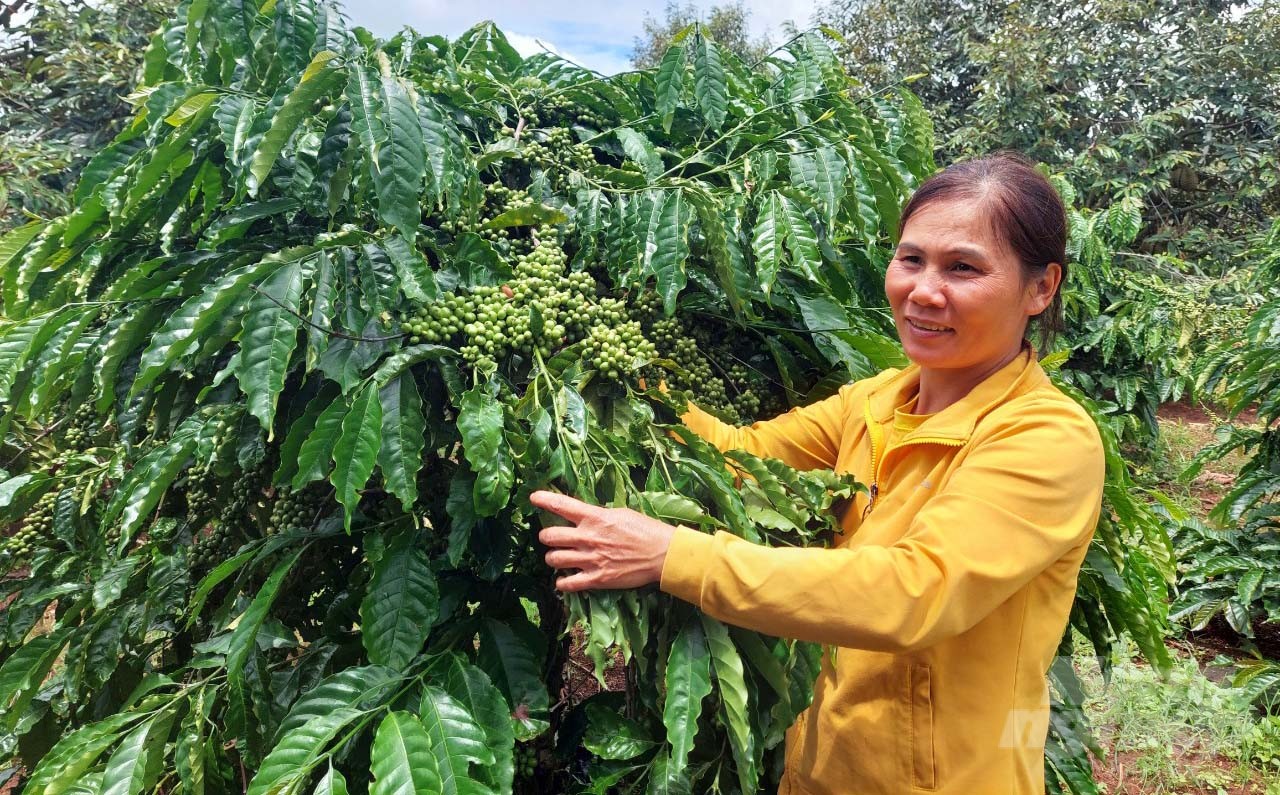
Currently, coffee farmers in Dak Lak practice production according to agricultural standards such as 4C, UTZ, etc. to improve product value. Photo: Minh Quy.
"We consider coffee to be a fruit tree, so if we want coffee to attain good quality, we must pick it ripe. At the same time, we must properly process it according to three long-standing classic methods, including dry processing, wet processing, and semi-wet processing. After processing, the preservation stage must also be good, ventilated, and kept at a low temperature. If these things can be implemented, the quality of Robusta coffee will be improved", shared Mr. Minh.
However, to do this, Mr. Minh said that it is necessary to involve the authorities. "For a long time, the authorities have had many administrative documents talking about this issue but have not been able to do so because there is no incentive or sanction mechanism.
The incentive here is that if coffee is picked ripe and of good quality, it has to be purchased at a high price. Up until now, all the coffee corporations here or the domestic companies have advocated producing coffee according to the certifications, but the purchase price is still low and not commensurate.
If ripe picking and a high purchasing price are encouraged, ripe picking will gradually become a habit. Thereby changing the awareness and responsibility of farmers in production. Only then will the quality of our coffee be improved," said Mr. Minh.
Dr. Phan Viet Ha, Deputy Director of the Western Highlands Agro-Forestry Scientific and Technical Institute (WASI), said that improving the quality of Robusta coffee is imperative to implement.
“According to forecasts, by 2050, half of the Arabica area will no longer be suitable due to climate change. Thus, high-quality Robusta will gradually replace Arabica.
Therefore, improving the quality of coffee requires the involvement of many parties. Firstly, it is in terms of varieties. In the past few years, when the specialty coffee movement increased, the Institute has focused on researching high-quality varieties. Currently, we have some high-quality varieties, such as TR11, TR14, or dwarf green. For these varieties that we fully cultivate, the potential for quality is very high," said Mr. Phan Viet Ha.
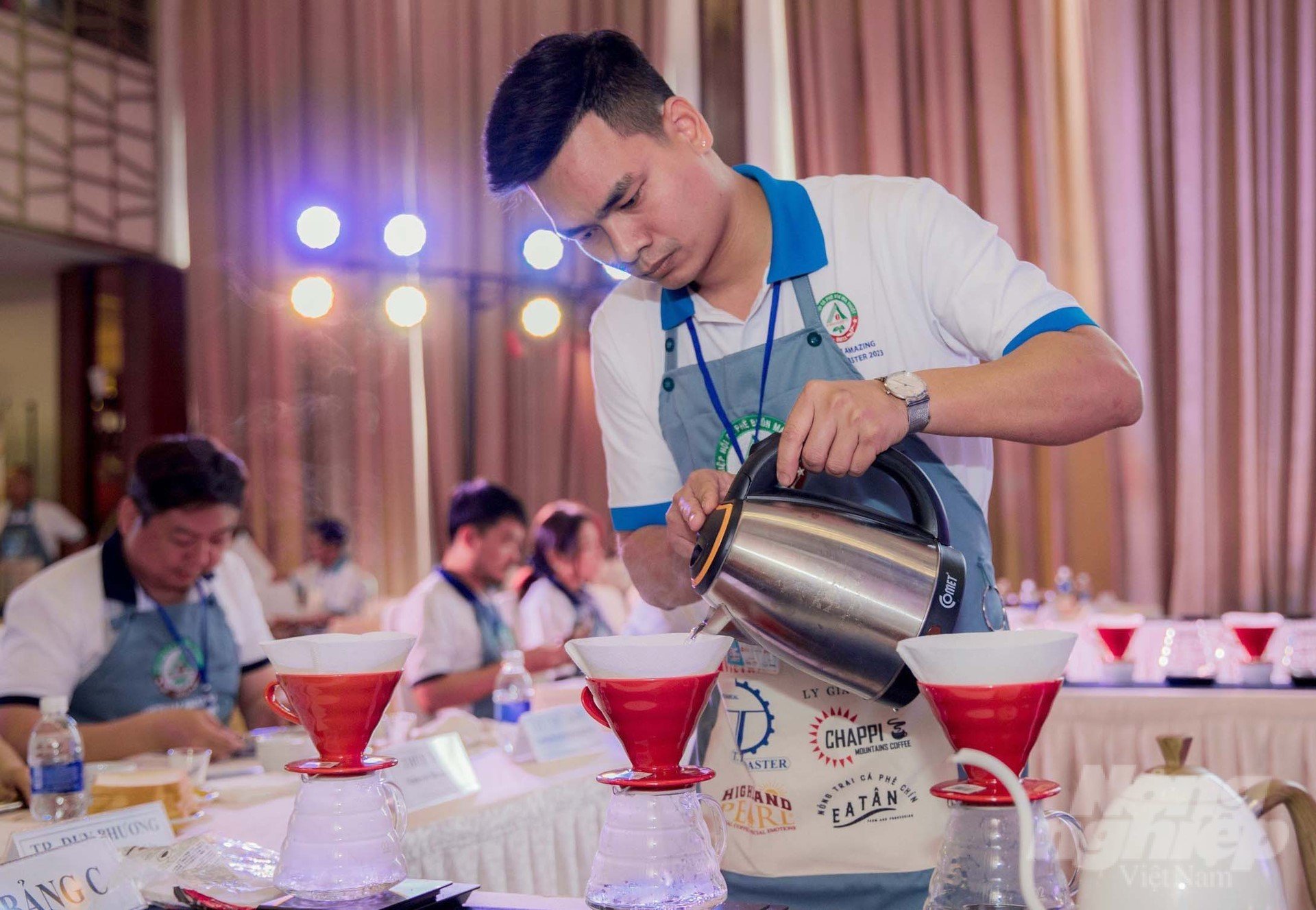
Coffee competitions are also regularly organized by enterprises to assess the production and processing capacities of their units. Photo: Minh Quy.
According to Deputy Director of WASI Phan Viet Ha, the Institute is also continuing to research and transplant high-quality coffee varieties. In the coming period, there will be higher-quality varieties for coffee cultivation. However, in addition to varieties, cultivation also contributes to improving the quality of coffee.
"Grown in shaded gardens with a watering regime, the quality of coffee will be better than that of unshaded gardens. Especially now, harvesting and processing are extremely important. For a long time, farmers have mainly harvested green fruit, which affects the quality. If wanting to improve the quality of coffee, it is necessary to recommend people harvest 100% ripe," said Mr. Ha.
According to Mr. Ha, the Vietnamese coffee varieties themselves have potential for quality. Compared to Brazil, Vietnam's origin of varieties is much better. Vietnam’s varieties come from Robusta, while Brazil’s varieties are from Conilon. Therefore, farmers only need to pick ripe fruit, and the quality is higher than in Brazil.
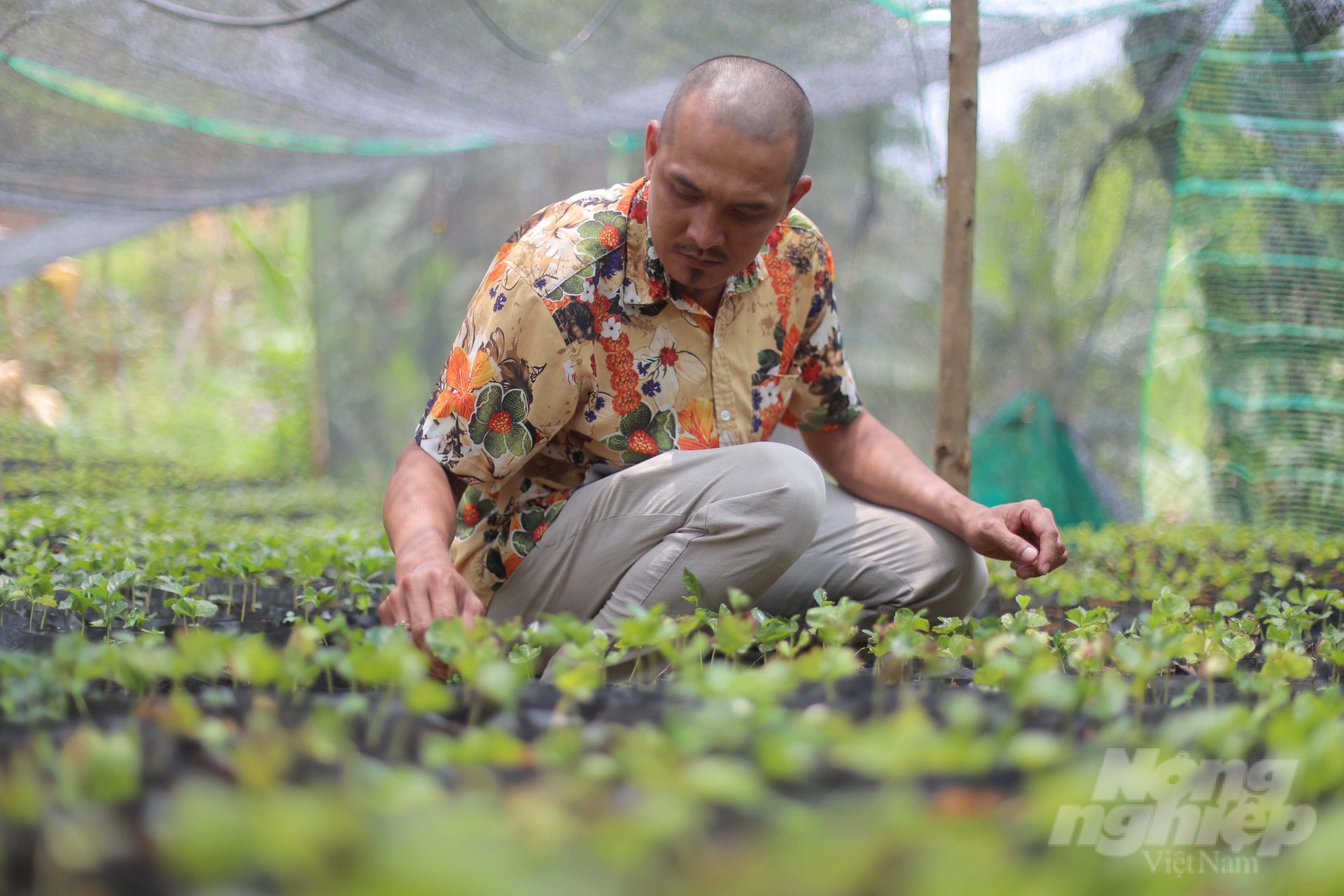
Model of high-quality coffee seedling production and selection in Lam Dong. Photo: Minh Hau.
"The area of coffee is large, so it is necessary to have a strategy to improve the quality. Firstly, raise awareness among people that they must pick ripe. Over the years, Vietnam has applied more modern processing methods that have helped improve the quality of coffee. Currently, Vietnam has many world-class specialty coffee products," said Mr. Ha.
In order to improve the quality of coffee, authorities need to redefine areas for high-quality coffee to develop a suitable cultivation process. Currently, the Government has approved the national product development program by 2030. Phase 2’s completion in terms of evaluating varieties and ecological conditions in areas will improve the quality of coffee.
"Overall changes from seed stage to processing, depending on different ecological conditions, should be adjusted accordingly. To do this, it is necessary to create value linkage chains.
Currently, there is no price policy equivalent to coffee quality. This is an important issue. Some enterprises commit to purchasing high-quality products at a higher price than those on the market. This action needs to be replicated in all coffee areas. When the price is high, people are forced to follow the standards of the purchasers. At this time, the quality of coffee will be improved," Dr. Phan Viet Ha affirmed.
Translated by Huyen Vu Thu

(VAN) Results from the Sustainable Durian Model Project in Dak Lak have confirmed the critical role of Yara Viet Nam in transferring advanced nutritional solutions to farmers.

(VAN) In Tuyen Quang province, livestock farmers have introduced effective models and innovative practices that significantly strengthen African Swine Fever prevention and control efforts.

(VAN) This is the study conducted by IRRI and Can Tho University on the rice straw value chain in Mekong Delta showing an economic potential of more than 6.6 trillion VND/year.

(VAN) By participating in cooperative economics, many farmers in Tay Ninh have overcome hardship, mastered clean dragon fruit cultivation techniques.

(VAN) The crossbreeding program in the former Binh Dinh province (now part of Gia Lai) has shown signs of decline, and urgent measures are needed to revive it and sustain past achievements.

(VAN) The agricultural sector agreed on a roadmap to pilot the MRV protocol and expand low-emission rice production from the 2025-2026 winter-spring crop.

(VAN) Agricultural extension officers in Quang Ninh do more than transmit knowledge; they have become a steadfast support system for farmers on the path to sustainable agricultural development.